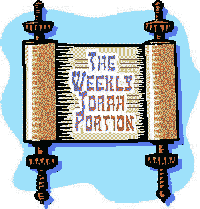Search our Archives:
» Home
» History
» Holidays
» Humor
» Places
» Thought
» Opinion & Society
» Writings
» Customs
» Misc.
|
Determining our Destiny
By Michael Chessen
Whereas the book of Exodus opens with an account of the
physical proliferation of the Jewish people, this week's reading of
V'aera
begins to document our spiritual molding into God's chosen people. Lest
one
mistake the term "chosen" for "superior", the Torah's narrative clearly
demonstrates that our transformation from slave nation to serving as a
light unto all nations is not a matter of biology, but the spiritual
vision
of God. This is to proceed according to four essential steps: I will
take
you out of Egypt, I will save you, I will redeem you(from the spiritual
depths of your bondage) and I will take you as My chosen people. Among
numerous other symbolic traditions which we have observed for over three
and a half millennia on the "festival of our freedom", this four step
process finds symbolic resonance in the four cups of wine which we drink
during our Passover Seder.
En route to the fulfillment of God's promises, we
witness
the step by step destruction of Egyptian civilization by way of the ten
plagues. This process commences in V'aera, the second reading of Exodus,
and invites comparison and contrast to the destruction of all known
civilization as documented in the second reading of Genesis, Noah. When
God
brings on the Great Flood, He does so with no prior warning save for the
spectacle of Noah building the Ark over the course of several modern
generations. In advance of Egypt's destruction, however, God, through
His
servants Moses and Aaron, issues quite a bit more than merely "subtle"
hints.
Our rabbis and commentators observe that not only do the
plagues constitute a richly symbolic "measure for measure" comeuppance
for
the numerous sufferings which the Egyptians inflicted upon the Jewish
people, but Pharaoh is allowed to "dig his own grave" by choosing to
have
his heart hardened. The concept here is that God assists any individual
in
fulfilling the goals one sets for one's self, be they the spiritual
reward
of the saint or the punishment incurred by the tyrant.
The idea of spiritual destination as a question of will finds
expression well before the onset of the plagues when God refers to the
Promised Land not as a "yerisha" (inheritance), but as a "morasha"
(heritage) (Exodus 6:8). The difference between these is that while the
former is merely the right of birth, the latter is only the merit of
active
input.
Wishing you all a Shabbat Shalom !

|
|
Please let us know if you see something unsavory on the Google Ads and we will have them removed. Email us with the offensive URL (www.something.com)
|





|
